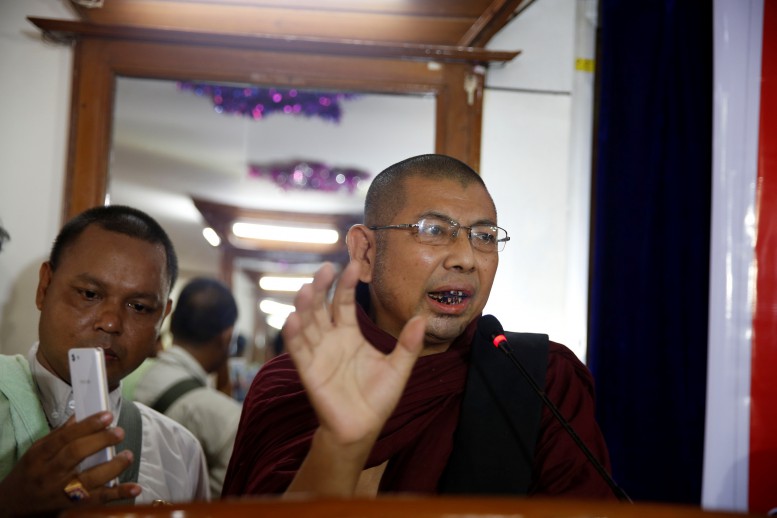Ultra-nationalist Buddhist monk Parmaukkha was today denied bail on charges of inciting unrest during an anti-Rohingya protest outside the US embassy in Yangon last year.
He was arrested on Sunday when he reportedly went to Dagon Myothit (North) police station in the former capital to apply for permission to stage another demonstration.
Parmaukkha was charged under the controversial Peaceful Assembly and Peaceful Procession Law, widely known as Article 19, as well as under Section 505 (b) of the penal code – for “inciting public unrest”.
Aung Myaing, a fellow Buddhist nationalist and spokesman for Parmaukkha, said that the monk was granted bail with regard to the charges under Article 19, but that the court maintained that no bail provisions exist under 505(b).
“His lawyer will lodge an appeal with the district court with regard to granting bail under 505 (b),” said Aung Myaing. “Parmaukkha had previously said that he would go on hunger strike if he were ever imprisoned. However, I hope he does not for the sake of his health.”
Parmaukkha faces up two years in prison if convicted.
“The monk was greeted by dozens of tearful supporters outside the Yangon court,” AFP reported, adding that the next hearing has been set for 21 November. Parmaukkha was escorted back to Insein Prison after today’s hearing.
Two other ultra-nationalist monks, Thu Seikta and Nyana Dhamma, who were detained during the US embassy protest last year, have not been charged.
Just six weeks ago, a court in Rangoon jailed four Burmese nationalists for staging a similar anti-Rohingya protest outside the US embassy in April.
[related]
Alongside nationalist firebrand monk Wirathu, Parmaukkha has been at the forefront of anti-Rohingya sentiment in Burma in recent years, during which time tensions have frequently descended into mob violence, leaving hundreds dead.
According to Reuters, Parmaukkha was a co-founder of Ma Ba Tha, the Burmese language acronym for the Association for Protection of Race and Religion, but he quit the radical Buddhist and anti-Muslim group last year, citing political differences.
A significant percentage of Burma’s majority Buddhist population are in favour of expelling or deporting the Rohingya Muslim community, and claim that they are “Bengalis” who are indigenous to Bangladesh, not Burma.



